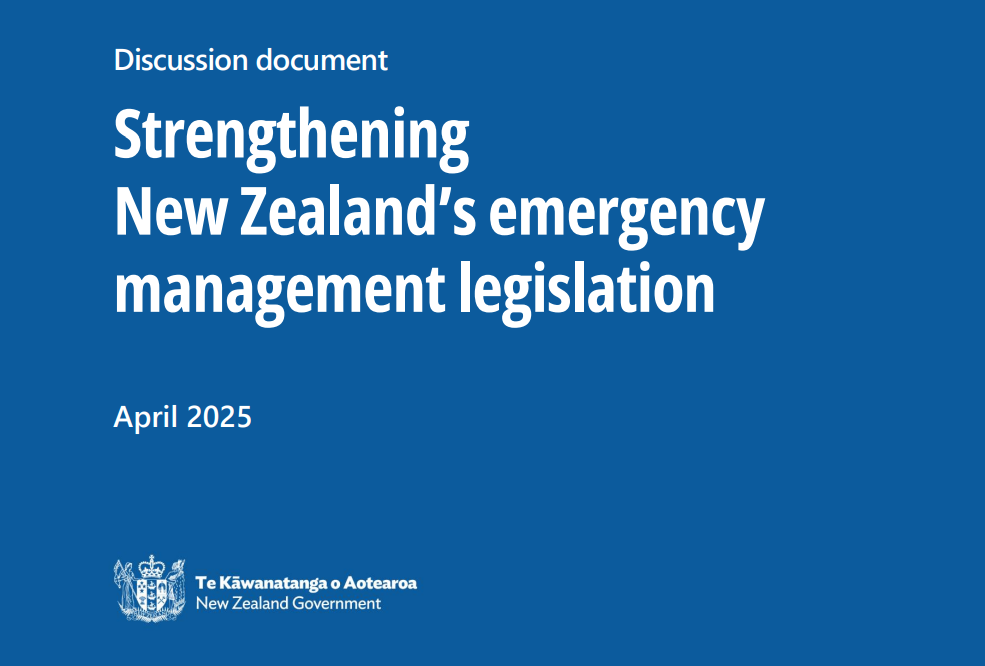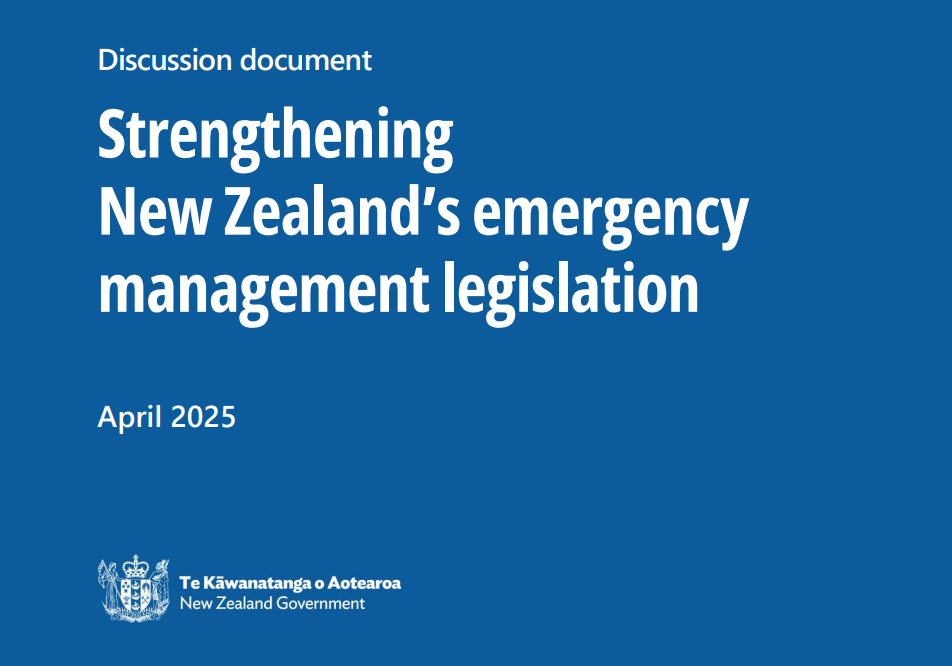What's On > News
Grey Lynn 2030: Response to Strengthening New Zealand’s emergency management legislation
 From 15 April to 13 May 2025 the government is inviting submissions on options to strengthen New Zealand’s overarching emergency management legislation and inform the design of a new Emergency Management Bill.
From 15 April to 13 May 2025 the government is inviting submissions on options to strengthen New Zealand’s overarching emergency management legislation and inform the design of a new Emergency Management Bill.
Our community group, Grey Lynn 2030, appreciates the opportunity to provide feedback on the discussion document Strengthening New Zealand’s emergency management legislation. We recognise the importance of updating the current framework to better address the increasing risks and complexities of more frequent emergencies.
After our direct experience with the Auckland Anniversary flood event, which significantly impacted our densely populated Waitemata community, we are particularly concerned with the emergency readiness for residents in the cities and particularly apartment buildings.
The increasing number of Aucklanders living in apartments means a power failure can render entire buildings uninhabitable, creating unique and significant challenges. For our many apartment residents, this includes:
- Inability to access apartments or lobby doors with electric password systems.
- Closure of vehicle access from shared garaging with electric doors.
- Cessation of electric water pumps for sewage and drinking water.
- Loss of internet communications.
- Complete loss of lighting.
- Impossibility of cooking without electricity.
Overall, we strongly support the proposed objectives of the new Bill, particularly the emphasis on strengthening community and Iwi Māori participation (Issue 2 & 3). Our on-the-ground experience consistently shows that local knowledge, networks, and initiatives are crucial in the immediate aftermath of an event and throughout the recovery process.
However, we believe the Bill needs to go further in several key areas, particularly on empowering apartment residents to enhance community resilience in our population-dense urban environments.
Key Priorities: We urge the Bill to prioritise:
Formal Recognition and Resourcing of Community-Led Initiatives (Relates to Issue 4): This is critical for leveraging local capacity.
Mandating Consideration of Apartment Residents in Local Emergency Management Plans (Relates to Issue 3): Their unique vulnerabilities require specific attention.
Clear Definition and Inclusion of Building Management as an Essential Service (Relates to Issue 11): Their role in maintaining essential functions in apartment buildings is paramount.
Strengthening Community Participation:
- Formal Recognition and Resourcing (Relates to Issue 4): While the document acknowledges the role of communities as first responders, it lacks concrete proposals for their formal recognition within the emergency management structure. We urge the Bill to include provisions for the accreditation, training, and resourcing of community-led emergency response teams and initiatives. This could involve dedicated funding streams, access to equipment, and proactive identification, training, and engagement of potential community emergency hubs before an emergency. We need clear pathways for integration with regional and national responses.
- There is a significant need to identify and resource emergency hubs within apartment buildings or clusters of apartment buildings. Residents in these vertical communities, particularly in areas like Waitemata with limited traditional community spaces, may have limited access to support networks. The Bill should consider how to equip and train designated individuals within apartment complexes to act as floor or building wardens and establish temporary support systems within the building itself. This could include funding for emergency supplies within buildings (first aid kits, communication devices, etc.) and training for residents in basic emergency response and evacuation procedures specific to high-rise environments. The inclusion of solar/battery/Starlink technologies should be considered to enable basic communication services during power outages
- Meaningful Engagement in Planning (Relates to Issue 3): Strengthening community participation requires more than consultation. The Bill should mandate genuine co-design of emergency management plans at the local level, ensuring community voices, including those of vulnerable groups and apartment residents, are integral in identifying needs, resources, and effective response strategies.
- Living in Waitemata, one of the most densely and complexly populated parts of New Zealand, with a significant proportion of residents in apartments, we have much to contribute. The January 2023 Auckland floods highlighted the vulnerability of our community. While Auckland Council has assisted the worst affected, the fundamental preparedness at the community level for Waitemata and residents remains unchanged at the on the ground level. We see a critical need to explicitly include the perspectives of dense city areas that include apartment dwellers in local emergency management plans.
- Evacuation routes (potentially limited to stairs during power outages), communication needs (which may differ significantly from those in detached houses, especially during internet/mobile failures). Reliance on building management should be specifically addressed. Workshops should specifically target apartment residents to understand their unique vulnerabilities and capacities, such as accessibility for residents with mobility issues in multi-story buildings during power outages.
- Support for Spontaneous Volunteers: The Bill should consider how to better integrate and support spontaneous volunteers who often emerge during emergencies. Clear guidelines and mechanisms for coordination, safety briefings, and task allocation would enhance their effectiveness and safety. In the context of apartment buildings, this might include residents with specific skills (e.g first aid, language translation) who can assist their neighbours. Building management or designated floor wardens could help identify and coordinate these internal volunteers safely and effectively.
- Awareness Raising and Training for Community Leaders: We are well aware of the places and people who have potential resources in an emergency. We need a community action plan to develop this.
- In Waitemata, there is no overarching community group with the dedicated ability and funding to develop this comprehensively for our diverse population, including a significant number of apartment residents.
- Waitmate while it does have some community groups – in the city centre with a more transient population, high number of renters these are not well established. Apartment buildings are the logical “community”- this needs to be considered rather than the church, marae or residents groups that operate in the suburbs.
- We need awareness campaigns and training opportunities specifically for city suburban residents and building managers. This could involve workshops on building-specific emergency plans (e.g for power blackouts) and communication protocols during an event. Identifying and training “community leaders” within apartment buildings is crucial, as they can act as vital links during an emergency.
Clarity in Roles and Responsibilities:
- Local Empowerment (Relates to Issue 5 & 6): While we understand the need for clear national and regional responsibilities, the Bill must ensure that local authorities and community groups have sufficient autonomy and resources to lead initial response and recovery efforts within their areas. Over-centralisation could stifle local initiative and delay crucial assistance, particularly in rapidly evolving urban emergency situations. Auckland Council Emergency Management needs clear guidelines and resources to support the unique needs of high-density residential areas and apartment buildings. This includes pre-planning for mass evacuation from apartment buildings if necessary, establishing temporary shelters in accessible locations for apartment residents (considering those with mobility issues), and ensuring communication channels that can reach individuals within these buildings (e.g., building-wide alert systems, potentially independent of mains power).
- Defining “Essential Services” (Relates to Issue 11): We believe the Bill needs a clearer and more inclusive definition of what constitutes an “essential service” at the community level. This should extend beyond utilities to include critical community support networks, such as local food banks, community centres, and volunteer organisations. In Auckland’s city centre, while there are food banks, there are very few readily accessible community centres and formally active volunteer organisations. Crucially, the definition must include building management and maintenance services in apartment complexes. During and after an emergency, residents rely on these services for essential functions like water supply, sanitation, and potentially security. The Bill should address the continuity of these apartment services or mandate contingency plans if they are disrupted.
Meeting Diverse Needs:
- Accessibility and Inclusion (Relates to Issue 1): While the document touches on diverse needs, the Bill should explicitly mandate accessible communication channels, culturally appropriate support, and tailored assistance for vulnerable populations, including people with disabilities, ethnic minorities (particularly new New Zealanders with fewer social networks), and the vulnerable elderly. This is particularly pertinent in apartment buildings where a diverse range of residents may live in close proximity. Accessibility in apartment buildings during emergencies, particularly for those with mobility issues during power outages when lifts may not function, requires specific attention. The Bill should mandate that emergency plans for high-density residential areas include specific provisions for evacuating and supporting these vulnerable residents. Consideration must also be given to language barriers, which are prevalent in diverse city centre apartment populations, and the need for multilingual emergency information.
- Psychological and Social Recovery: The Bill should give greater emphasis to the long-term psychological and social recovery of communities affected by emergencies. This includes provisions for mental health support, community-led healing initiatives, and resources to rebuild social infrastructure. Residents of apartment buildings, who may have experienced the emergency in close proximity to many others or who may lack strong social connections within their building, might experience unique psychological challenges. The Bill should encourage community-led initiatives within apartment complexes to foster social support during and after recovery.
Other Considerations Specific to Apartment Buildings:
- Evacuation Challenges: Mass evacuation from multi-story buildings, especially for the elderly, people with disabilities, and families with young children, presents significant challenges when elevators are unusable and stairwells become congested and dangerous due to lack of lighting. Emergency plans must address these specific logistical hurdles.
- Communication Barriers: Traditional communication methods (e.g public broadcasts primarily in English) might not effectively reach all city residents, especially those who are not fluent in English or who may not have access to main stream media due to power outages or language preferences. Multi-lingual and building-specific communication strategies are essential in Waitemata.
- Resource Sharing: There may be significant opportunities for resource sharing among residents within apartment buildings (e.g., generators, food supplies, skills). Emergency plans could facilitate the identification and coordination of these internal resources.
- Building Management Role: Building management is essential in emergency preparedness, response, and recovery within apartment complexes. The Bill could outline clear responsibilities and requirements for building owners and managers in developing and implementing emergency plans tailored to their residents and building infrastructure.
Iwi Māori Participation (Relates to Issue 2):
We strongly support the objective of strengthening Iwi Māori participation. The Bill must go beyond consultation and ensure genuine partnership and recognition of tino rangatiratanga in emergency management planning and response. This includes respecting mātauranga Māori and empowering iwi and hapū to lead responses within their rohe. In the context of urban environments with significant Māori populations residing in apartments, culturally appropriate communication and support mechanisms within building-level emergency plans should be considered in partnership with local iwi.
In conclusion, Grey Lynn 2030 believes that the new Emergency Management Bill has the potential to significantly improve New Zealand’s resilience. However, to truly achieve a “whole-of-society” approach, the legislation must place a significantly greater emphasis on empowering local communities, with specific and tailored considerations for the growing number of New Zealanders living in apartment buildings.
This includes formal recognition, resourcing, genuine engagement, and respect for their unique knowledge and capabilities.
We look forward to further engagement in the development of this crucial legislation.
Sincerely,
The Grey Lynn 2030 Committee

